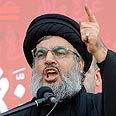
Hezbollah's Hassan Nasrallah
Photo: EPA
The increasing flow of weapons from Syria to Hezbollah raises the temperature along the northern border and creates tension and dilemmas. As Assad's regime continues to disintegrate, we will witness more and more cycles of mounting tension followed by calm on the Lebanese front. But there is a very high probability that one of the next cycles will end with a military conflict, even in war. It depends who will be holding the reins in Israel and if a wise and experienced official will be found in the political-security establishment who will know when to pull the trigger and when to hold fire.
Over the past year Russia has sold Syria advanced military systems, including radars, which are of no use to Syria today, unless it plans to transfer them to Hezbollah. President Bashar Assad is also trying to acquire sea-to-land missiles, which could threaten the sailing routes to Haifa Port and the Israeli Navy's activity off the coasts of Syria and Lebanon – in the event the missiles end up in Hezbollah's hands.
Shiite Group
Riccardo Dugulin
Op-ed: Iranian proxy could once again turn Lebanon into battleground for defense of foreign interests
Hezbollah used to store the advanced equipment in warehouses in Syria, but over the past few months, due to Assad's weakened status, the Shiite organization understands that the weapons cannot remain there. And as soon as these weapons arrive in Lebanon, they are stored in underground storage facilities. Trying to find them would be like looking for a needle in a haystack.
Arms depots explode on occasion, also in Lebanon. Hezbollah always blames Israel, but Israel's policy has been that the strengthening of a neighboring country through the acquisition of weapons does not constitute a just cause for war.
Since the Second Lebanon War Hezbollah has acquired more than 60,000 missiles and rockets – and Israel did not go to war. It did not go to war when it discovered that long-range, accurate M-600 missiles were brought into Lebanon, and it did not go to war when Scud-D missiles were smuggled into its northern neighbor. Lately Hezbollah has been trying to smuggle into Lebanon Scud-B missiles, which can be armed with chemical warheads.
All of this is true when we are dealing with conventional weapons, but when chemical or any other type of non-conventional weapons enter the picture, Israel's security policy becomes much clearer.
In the event that chemical weapons do reach Lebanon, it is safe to assume that Israel will not hesitate – and attack. The dilemma, at the end of the day, is political, as is the decision. And so, we return to the crucial question: Is there someone within the political-security establishment who is capable of making the right decisions?















